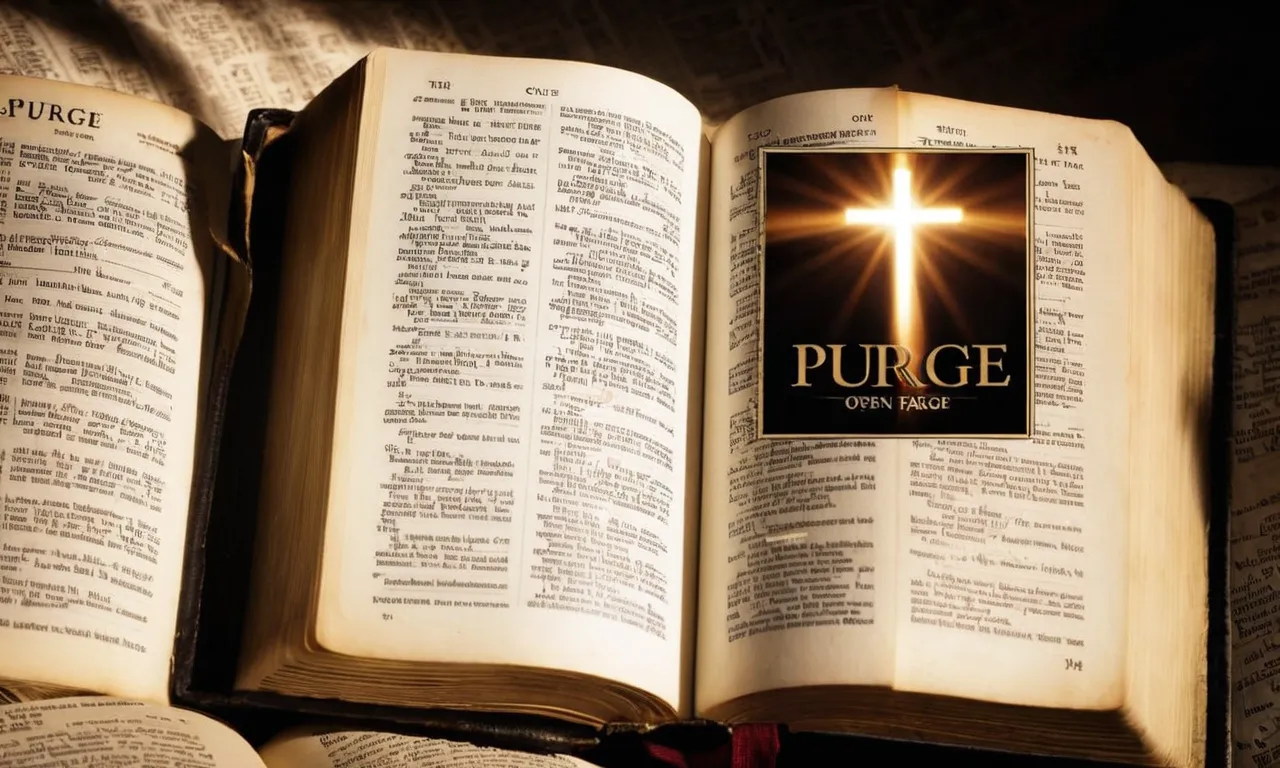What Does ‘Purge’ Mean In The Bible?
The concept of purging, or cleansing from sin and impurity, is an important theme throughout the Bible. If you’re short on time, here’s a quick answer: In the Bible, to ‘purge’ means to remove or get rid of something undesirable, often through cleansing or punishment.
In this comprehensive article, we will explore the biblical meaning of purging more fully by looking at various instances where forms of the word ‘purge’ appear, examining the Hebrew and Greek words behind the English translations, and considering what these verses teach us about the nature of sin, judgment, atonement, and holiness.
The Meaning of ‘Purge’ in the Old Testament
‘Purge’ as Removing Ritual Impurity
In the Old Testament, the Hebrew word translated as “purge” often refers to the removal of ritual impurity or sin. Ritual impurity could result from contact with unclean things, bodily discharges, childbirth, disease, and death.
To be purified or cleansed from impurity, sacrifices and washings were required.
For example, after giving birth, a woman was considered ritually unclean. According to Leviticus 12:7, she had to offer a sacrifice “to make atonement for her, and she will be clean from her flow of blood.”
The sacrifice removed her impurity or “purged” her so she could be declared clean and restored to the community.
The Day of Atonement ritual also included purging impurity from the people and the sanctuary: “On this day atonement will be made for you, to cleanse you. Then, before the LORD, you will be clean from all your sins” (Leviticus 16:30).
The sacrificial blood was sprinkled as a “purge offering” to remove impurities.
‘Purge’ as Judgment for Sin
The term “purge” is also used in the context of God’s judgment on those who refuse to repent of their sins. Divine punishment is seen as a purifying act that removes wickedness from the land. For instance, when Saul disobeyed God’s command, the prophet Samuel declared: “He who is the Glory of Israel does not lie or change his mind; for he is not a human being, that he should change his mind.”
Saul replied, “I have sinned. Now honor me before the elders of my people and before Israel; come back with me, so that I may worship the Lord your God.” But Samuel said, “I will not go back with you. You have rejected the word of the Lord, and the Lord has rejected you as king over Israel!”
(1 Samuel 15:29-31). Saul’s disobedience resulted in his purge from the kingdom.
The prophets Isaiah and Ezekiel use purge imagery to warn of coming judgment on those who defiantly continue in sin: “By this the iniquity of Jacob will be purged, And this is all the fruit of taking away his sin” (Isaiah 27:9). “I will purge you of those who revolt and rebel against me.
Although I will bring them out of the land where they are living, yet they will not enter the land of Israel. Then you will know that I am the Lord” (Ezekiel 20:38). While punishment would be severe, it would ultimately cleanse the nation of evil.
So in the Old Testament, the term “purge” carries connotations of purification from impurity, atonement for sin, and judgment for cleansing the land. It involves the removal of contamination and wickedness to restore holiness and righteousness in the people.
While often stern, the concept reflects God’s justice and His desire for the wellbeing of His creation.
The Meaning of ‘Purge’ in the New Testament
Purging as Cleansing from Sin
In the New Testament, the concept of purging often refers to cleansing from sin. When Jesus began his ministry, John the Baptist declared that Jesus would “purge his floor” and burn the chaff with “unquenchable fire,” indicating Jesus would separate the righteous from the wicked (Matthew 3:12, KJV).
Jesus frequently used agricultural metaphors like this to illustrate spiritual truths.
The book of Hebrews also connects the idea of purging with cleansing from sin, stating that according to the law, “without shedding of blood is no remission” of sins (Hebrews 9:22, KJV). It further explains that the blood sacrifices made under the old covenant symbolized the ultimate, once-for-all sacrifice of Christ that would purge our consciences from sin (Hebrews 9:13-14, ESV).
This purging makes believers in Jesus pure before God, as the apostle John wrote: “If we confess our sins, he is faithful and just to forgive us our sins, and to cleanse us from all unrighteousness” (1 John 1:9, KJV, emphasis added). What an awesome promise!
Purging in Revelation’s Visions of Judgment
The book of Revelation contains several visions with symbolic depictions of God’s coming judgment on those who refuse to repent of sin. Some of these visions use the term “purge” regarding this judgment.
For example, Revelation 3:16 says Jesus “will spit you out of my mouth” regarding the lukewarm church at Laodicea. The Greek word translated “spit out” can also mean “to vomit” or “to purge.” Though graphic, it portrays Christ rejecting those who are complacent and indifferent toward him and the truth he taught.
Revelation’s visions also depict seven angels “having the seven last plagues” to pour out upon the wicked (Revelation 15:1, ESV). The original Greek word translated “plagues” can also mean “blows” or “stripes.”
The passage symbolizes God allowing people to experience the ultimate consequences of their rebellious choices, purging wickedness from the world he created.
The good news is that God “is patient toward you, not wishing that any should perish, but that all should reach repentance” (2 Peter 3:9, ESV). He continually invites people to receive the purging from sin available through Jesus Christ before judgment comes.
Theological Significance of Purging
Sin Requires Atonement
According to the Bible, sin separates humanity from the holy God (Isaiah 59:2). As creatures with a sinful nature, all people fall short of God’s perfect standard (Romans 3:23). However, God desires a loving relationship with His people.
Therefore, the effects of sin must be dealt with for reconciliation and fellowship between God and humans to occur. This is where purging comes in.
In the Old Testament, animal sacrifices were required by God as an atonement for sin. Shedding the blood of spotless animals served as a substitute for the punishment that humans deserved (Leviticus 17:11). However, animal sacrifices could not fully atone for sin permanently.
They pointed ahead to the ultimate sacrifice of Christ on the cross, which fully atoned for sin once for all (Hebrews 10:1-18). When people put their faith in Christ’s redemptive work, they experience cleansing from sin’s stain.
God’s Holiness Requires Judgment of Sin
A key attribute of God’s character is His holiness and moral purity (Isaiah 6:3). Therefore, He cannot overlook or excuse sin. His righteous nature requires that He judge sin. Although God is patient and slow to anger (Exodus 34:6), His wrath will come against all ungodliness and wickedness (Romans 1:18).
Sin has deadly consequences, for “the wages of sin is death” (Romans 6:23).
Thankfully, God’s mercy provides a way of escape through the atoning sacrifice of Christ. Those who trust in Jesus’ death on their behalf will not face condemnation on judgment day (John 3:18). However, willful unbelief and rejection of God’s offer of salvation will result in eternal separation from God (2 Thessalonians 1:8-9).
Purging sin through Christ is the only way to be spared from God’s future wrath against sin.
Believers Must Pursue Holiness
Although believers in Christ have their sins forgiven through His death and resurrection, they still struggle with sinful tendencies in this life. Becoming more Christlike is a lifelong process of purging sinful attitudes and actions from one’s life.
The Bible calls followers of Jesus to purify themselves from everything that contaminates body and spirit (2 Corinthians 7:1). Through the indwelling Holy Spirit, Christians have power to overcome sinful desires and walk in obedience to Christ (Galatians 5:16-17).
However, believers must make deliberate efforts to rid their lives of sinful patterns and cultivate godly virtues (Colossians 3:5-14). Maintaining fellowship with Christ and undergoing His purifying work is key to growing in holiness (John 15:1-11).
The purging of sin applies not only to individuals but also to the corporate body of believers, the Church. Sometimes, unrepentant sin must be confronted and dealt with through church discipline for the purity of the body (1 Corinthians 5:6-8).
As believers spur each other on to love and good deeds, the Church grows into maturity in Christ (Hebrews 10:24-25).
Conclusion
As we have seen through various Old and New Testament usages, the concept of purging in the Bible points to the removal of impurity, sin, and all that opposes God’s holy character. It is a vivid image of the atonement required for sin and the refining judgment God brings to perfect holiness in His people and creation.
This biblical vision of purging calls followers of Christ to walk in purity and anticipate the glorious day when God will fully purge all sin from His presence.








